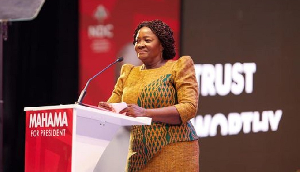Opinions of Friday, 20 September 2013
Columnist: Ziem, Joseph
Poor Wages: The Effect on Journalists' Reputations,
Poor Wages: The Effect on Journalists’ Reputations, Their Media Houses
By Joseph Ziem
Robert Greene in his book titled “The Concise 48 Laws of Power” said “…..In the social realm, appearances are the barometer of almost all of our judgments, and you must never be misled into believing otherwise. One false slip, one awkward or sudden change in your appearance, can prove disastrous.”
There is also an everyday mantra which says that, “Outward appearances are sometimes deceptive”. Yes sometimes, but most of the time they actually describe the true identity or exhibit the exact character of a person, either through the clothe he wears, food he eats, way she talks and so on. Thus, one ought to be very careful in his/her outward appearance or the way s/he behaves when in public, because that could send a bad signal about him/herself to others.
I recall back in the journalism school, my journalism lecturer Mr. Mark Bunde (R.I.P) used to admonish me and my colleagues, that we should never fight over refreshments or brown envelops when we attend events, after completing our course. This advice has followed me up till date. I don’t remember ever arguing with an event organizer over per diem/transportation or what is commonly known in media parlance as “soli” since I began my career seven years ago.
One may ask why? This is because I have a reputation to protect. Besides, I hate to quarrel or have a cold relationship with someone just because of money. If an event organiser invites me for a programme, I usually don’t expect anything like money from s/he. However, if s/he gives me money after the event, I gladly accept it and thank him/her, after all one good turn, legends say, deserves another.
However, I don’t allow such white or brown envelops to have an influence in the way I write my story. This attitude makes it difficult for some event organisers in the Northern Region to understand the kind of journalist I am. Besides, should the event organizer even let me get the impression that, he is giving me the money because he expects me to write a “good story” for him, I either give him back his money or take it and refuse to write the story.
Moreover, it’s okay for me to attend an event that last within 30 minutes or 1 hour and not given anything. But for an event organizer to waste my entire day and show little or no appreciation at all sometimes get me angry. In fact, in such moments, I usually will go home and sleep over the story and that is the end. I don’t complain or openly protest in the presence of the event organiser because I have been badly treated. I refuse to indulge in such an unruly act because of my reputation, my editor’s and that of The Daily Dispatch, and it shouldn’t take me to destroy that hard won reputation.
Dear reader, I am privileged once again to write on a very important topic like this because it borders on the welfare of the majority of the country’s journalists who seize almost every opportunity to speak on the welfare of everyone through their reportage. Sadly, majority of the citizenry think that all is well for journalists.
Quite recently, I happened to be a participant at a three-day (21 and 23 August, 2013) capacity building workshop organized for the Media Network for Social Accountability (MeNSA) at the Institute of Local Government Studies (ILGS), Accra and I personally witnessed a very nasty development that has the tendency to put a blot on the reputations of the country’s journalists and their respective media houses.
The workshop was organized by the Ministry of Local Government and Rural Development (MLGRD) as part of the implementation of the Local Government Capacity Support Project (LGCSP). The five-year World Bank and Government of Ghana project valued at US$175.0 million seeks to strengthen the capacity of 46 Metropolitan and Municipal Assemblies (MMAs) as well as stimulate demand for Accountable Local Governance and Service Delivery.
Whilst the workshop was actually intended to enhance the knowledge and understanding of MeNSA members who consist of editors and senior reporters as well as other media practitioners on issues of Public Financial Management, the attention of participants on the second day was suddenly deviated to a some sort of incessant calls emanating from some individuals to organizers, regarding how much each person would get by the end of the three-day programme.
This was made known to everyone by one of the officials of MLGRD who could no longer bear the calls inundating her mobile phone and therefore had to rush from her office like a speed of light to the workshop venue and as soon as she arrived, she posed a rhetorical question: Are we here for money or knowledge? In fact, most participants including me were embarrassed and angry, and wondered why the middle-aged woman could ask such a question, until she explained.
Whilst there was a huge debate going on about whether we were there for money or knowledge, I told a colleague sitting next to me that I wasn’t surprised at all about the development. Why? This is because monies sometimes allocated to journalists by event organizers as payment for their per diems mostly don’t get to them.
Also, it is common these days to hear of reports of some event organizers cutting down per diems for media men and still have the effrontery to tell them that they will be seen later and that is the end of it.
Politicians, NGO workers and so called public relations officers of even some religious and state institutions have developed the penchant for spending monies which are supposed to be given to journalists after they cover their events. This practice doesn’t seem to be getting over anytime soon, hence the reason why some journalists are now overlooking their professional ethics and beginning to ask event organizers how much they’re getting as per diem at the end of an event.
Please, am not suggesting that officials of the MLGRD were up to mischief or wanted to cheat all the participants, but considering the kind of behavior that was put up by some of my learned colleagues, the aforementioned argument I made could be what informed their ‘misbehaviour’.
Indeed journalists are forbidden to accept money or gifts of any kind from event organisers, but as long as the majority of Ghanaian journalists continue to silently wallow in hopelessness and in penury, the few frustrated ones will occasionally burst out in circumstances like the MeNSA workshop and that behaviour, if not checked, could tarnish the images and reputations of their own selves and respective media houses.
My fear is that, if nothing is urgently done about the conditions of service of Ghanaian journalists and media practitioners in general, a time will come the industry will be rated as the most corrupt in this country. And can you imagine the situation whereby journalists who are expected to fight corruption in our society suddenly become corrupt themselves?
Whilst the debate regarding how much each participant would get at the end of the workshop raged on, one participant who I suspected could be one of those bothering the MLGRD’s official over the amount of per diem he would be given, stood up to talk. When he was granted permission, he made comparisons of the per diem he’d learnt participants would be given to what executive members of MeNSA were given when they were invited to a meeting in Accra, a week before the workshop. According to him, what he and his colleagues were expecting as per diem was too meager and asked for a top up.
The MeNSA is to serve as a focal point for information sharing on Local Government Public Financial Management issues and therefore go a long way to ensure transparency and accountability in Ghana’s Local Government System. But as to whether MeNSA members will be willing to stay together to see how LGCSP grows to a mature stage, only time will tell especially when demands for bigger per diems by some people seem to be an issue.
The writer is a freelance journalist and a social media fanatic based in Tamale. Views or comments may be sent to him via ziemjoseph@gmail.com
Entertainment











